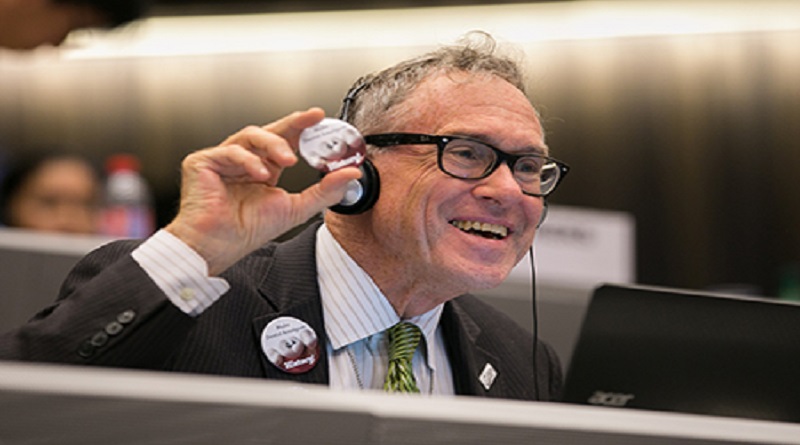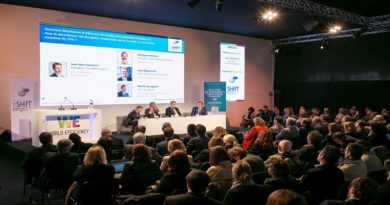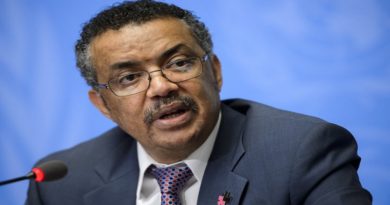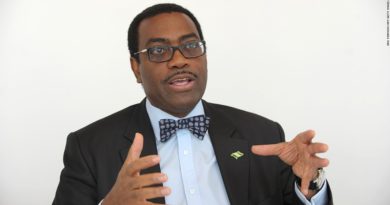Nigeria, other African countries are ready to end use of dental amalgam- Charlie Brown
Photo Caption: President of the World Alliance for Mercury-Free Dentistry, Attorney Charlie Brown.
Attorney Charlie Brown is the President of World Alliance for Mercury-Free Dentistry. He recently visited Nigeria for the fourth time on his global campaign for mercury-free dentistry where he attended a workshop on developing national policy on phasing down of amalgam use in Nigeria and met with Lagos and Edo states officials. He shared his views on Nigeria and other African nations’ effort to phase down and phase out dental amalgam with KAYODE ABOYEJI. Excerpt.
What is your take on the Nigeria’s effort in phasing down and out dental amalgam?
It is overwhelming. Nigeria’s dental community, academic community, governments-federal and the two pilot states- they are all ready to end amalgam use for children. That is just what Europe is doing. European Union is now phasing down amalgam, they have taken a huge step and Nigeria is taking a huge first step that is the beginning of the end for amalgam. If amalgam can’t be used in one category of patients, if it’s not good when a child is fifteen why is it good when that child is sixteen? Also people now realised that a young person would say if it wasn’t good when I was a child, then why now? Or if it isn’t good for a pregnant woman, how about a woman who might be pregnant, a woman who thinks I want to be pregnant in a year or I want to keep my body non-toxic in case I choose to become pregnant in two years, five years or ten years. So all this is tremendous — it’s laying all of the ground work in dental amalgam in Nigeria, and when you succeed in Nigeria you are well on the road to succeed in Africa.
As the president of the World Alliance for Mercury-Free Dentistry, you have been moving around African countries aside from Nigeria. What gives you the drive for doing all of this for the African countries?
It’s exciting; the feedback I get is so good from governments, dental associations and is so good from the NGOs. I think Africans have always been empowered but now they can see results from being empowered and they have been pushed around by Europeans and other Westerners for centuries and now they are saying we are going to take our own destiny, we are going to grab our own destinies in our own hands and amalgam is one of those where you can succeed. It’s a perfect situation. Don’t make the mistake Europe made by giving everybody amalgam then switch, just leap past amalgam. Amalgam is a primitive 19th century material, it has no role in 21st century dentistry, Africans know, Europeans know, Americans know, Asians know and for Africa which uses the least amalgam, there is no point to start using amalgam now. The West can confidently say we want to keep amalgam in Africa, we want to keep selling amalgam in Africa, but it cannot stop Nigerians from moving forward.
The decision of “mercury fillings” or “no mercury fillings” is one with three participants: the consumer (or the parent), the dentist, and the government. Here is where it gets exciting: If ANY of the three say NO to mercury, there’s no amalgam filling: the nontoxic alternative must be used. First, the consumer or parent can veto it. Or second, the dentist can become mercury-free. Or third, the government can stop its importing into the nation. Africans are totally empowered to stop this toxin! Western interests who want to continue amalgam sales to Africa – and yes, they do – cannot succeed if the consumer says no, or if the dentist says no, or if the government says no.
You have traveled to other African countries, are you impressed with their response to ending use of amalgam
well?
Yes, we are seeing real successes. Togo for example always took the position from the start of the Minamata Convention that amalgam should be phased out. Togo needed a road map to do it and that is why I am returning to Togo this week — second visit, I was there last year. Côte d’Ivoire has a great campaign; this is where we started our campaign for mercury-free dentistry with Dominique Bally and it’s now called the African Centre for Environmental Health. It is our Regional Headquarters. Cameroun with Kuepouo Gilbert has a campaign that is second to none. We have very strong campaigns in Tanzania and in Kenya. We have campaigns North, South, East, West and Central Africa. Tunisia is our model Arab state for mercury-free dentistry.. Clearly, Africans want to act and we have enough campaigns well 50 campaigns in Africa.
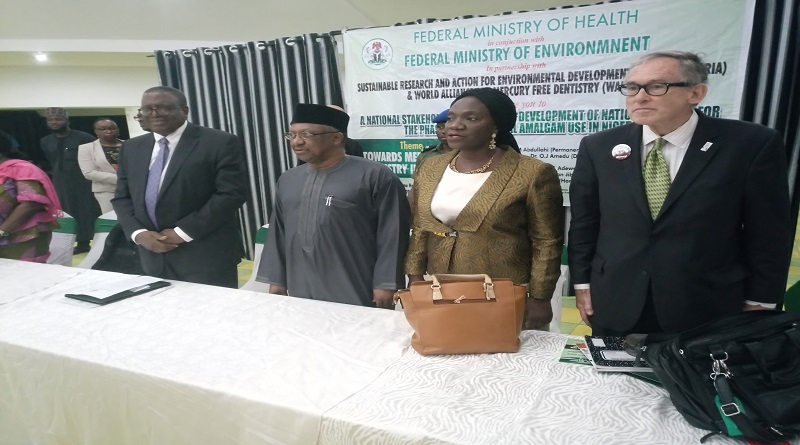
Nigeria is in the process of developing a national policy to face down dental amalgam. What is your take on this?
Nigeria is Africa’s largest economy and has more than one-sixth of all Africans, So, what Nigeria does is going to affect Africa: There is a U.S. expression, “California sneezes Americans catch cold.” Same here: when Nigeria sneezes Africa will catch cold. Let’s look at the major steps Nigeria has done – the landmark achievements coming from several parts of this great nation. .Nigeria started the campaign with the Abuja Declaration for Mercury-Free Dentistry, in 2014: a civil society goal that amalgam end first of all in Africa.. Its impact reverberated across the continent; for example, the Africa Day for Mercury-Free Dentistry, held every 13 October. Then, wow, the Abuja Declaration became the prototype for the world: in 2015, the Dhaka Declaration for r mercury-free dentistry for Asia; then in 2017, the Berlin declaration for mercury-free dentistry by 2022 for the European Union, and then this year, 2018, the Chicago declaration for mercury-free dentistry for America.
Another first in Africa: Nigeria has a consumer fact sheet, co-produced by the federal Consumers Protection Council and the NGO SRADev. It has been translated into Swahili for use in East Africa. . Nigeria convened the dental school Deans with organized by former Dean Godwin T. Arotiba of Lagos University Teaching Hospital (LUTH), the first dental school in Sub-Saharan Africa. Their communiqué, jointly issued with that great NGO SRADev, calls for the end to amalgam in Nigeria, and produced its own road map. Since then, dental education in Nigeria has been moving rapidly toward mercury-free dentistry and leaving amalgam as an historical relic. the federal government. We met with them; they very much want to keep up the mercury, so all the players, the federal players, the NAFDAC, Ministry of environment, and Ministry of health. We have the model state programmes for this in the south-south where I am now in the middle state and Lagos state, so by having model state programmes, we lead the way and show the way to the rest of the country. We are really touching each way we are figuring out each way to get at this. State, the federal dentistry to leadership to dentists, consumers and NGOs and NGOs to the consumers that they fight, work for. All this rounds show that the momentum is here, Nigeria is going to end amalgam for children that is the step and Nigeria is ready, Nigeria is preparing to face out amalgam.
So, aside from the policy that the government is trying to put in place, what else do you want Nigeria to do in this area of ending use of dental amalgam particularly the federal government?
The federal government can end all amalgam use in children – the population whose developing neurological systems are most susceptible to the neurotoxic effects of mercury. There is the role of dental schools, which says the federal roles of the dental schools can do with themselves but they can initiate that, the federal government can continue with consumer’s education but the consumers need to be well in, be bold in protecting their children and unborn babies from this mercury product, and say no to dentists who offer amalgam. Consumers have got to say to their dentist, I don’t want amalgam, parents have got to say I don’t want amalgam. The federal government can change government programs and that is happening, Lagos is doing that in a real pioneering way, they are changing their hospitals. Lagos has a lot of hospitals, 14 of them are doing dental care, and one is for children only. They can reach the end of amalgam for children directly in the government programs. The place where we are falling down worldwide is the growing gap between the middle class and we are talking the middle class of course in every countries that is, India, Europe wide, Poland, Costa Rica, the United States, Nigeria, Ghana, the middle class is not getting amalgam and that is fantastic but the government programs mean the lower income people are still not getting that benefit and if Nigeria will change its hospitals, change its government programs then they will get mercury-free dentistry.
So, what else do you like to add, maybe for government, for NGOs in regards to this initiative?
Well, I want to say the NGOs community in Nigeria is fantastic, I just know some of the great people north west and they are entirely committed people, certainly working with Leslie Adogame of SRADev- Nigeria, it’s a great honour to work with Leslie, what he puts together, he puts together constantly not just on dental amalgam but one program against toxics after another that he has led. He’s got a whale of a network, he’s got great strategic ideas, it’s fantastic. Equally, it has been an honour to work here in Edo state with Tom Aneni and the NGO he leads. Tom is also the chairman of the Edo State Water Group that links nationwide. I am impressed that we had the NGOs meeting in Abuja three years ago and I met a lot of the NGO leaders in Abuja and Ibadan and am just so impressed we had that many people. Nigeria is a very educated, they believe in education and also empowerment of themselves because the world does not really help them so they know what they need to do and they are doing it. The country is moving forward and it is not because anybody is helping them, it is because they have decided this is something we need to do and they can’t do it all, they know they got to do it through basic education, through manufacturing, through services, through keeping toxicants out, and all the steps that will transition Nigeria into not only an African power but the world power that it will become.
So, will you like to visit Nigeria again?
I will be back, I have been here four times and I will be back, no doubt about that. Thank you, Kayode and thank you for your newsletter. Ecogreen News is fast becoming a major information source about, and advocate for, the environment of Nigeria, of Africa the continent, and of the entire world.

